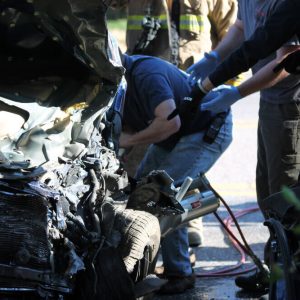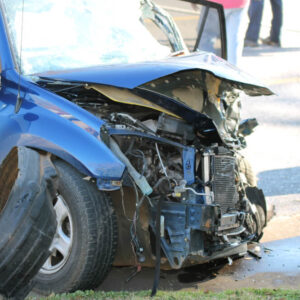 The unexpected can happen whenever we’re driving on a road or highway. We could be involved in an accident. We never plan for them, so they can be traumatic when they happen. This is especially true when you suffer serious injuries. This is the case whether your accident involved another car, a motorcycle, or an 18-wheeler. How are truck accidents different than car vs. car accidents? They are often much worse.
The unexpected can happen whenever we’re driving on a road or highway. We could be involved in an accident. We never plan for them, so they can be traumatic when they happen. This is especially true when you suffer serious injuries. This is the case whether your accident involved another car, a motorcycle, or an 18-wheeler. How are truck accidents different than car vs. car accidents? They are often much worse.
If you’ve been in an accident with a commercial truck, you may be entitled to compensation for your injuries. You need an experienced truck accident attorney to help you get the justice you deserve. The attorneys at Benton Accident & Injury Lawyers are exactly who you need by your side to hold the person that caused your accident responsible.
Whether you were in an accident with another car or a truck, the mental and emotional effects may be the same. However, not all accidents are the same.
Size and Weight Considerations
One significant difference between truck accidents and other vehicle accidents is the size and weight of a semi-truck and the potential damage that results from a collision. The damage can be significant if you’re driving a car and are involved in an accident with another car. But the damage can be even more severe if you’re driving a car and are involved in an accident with an 18-wheeler. Injuries are even more likely to be fatal than in an auto-to-auto crash.
A fully loaded commercial truck can weigh 80,000 pounds. When a truck heavily collides with a car, the potential for the car to be completely crushed is high. In some cases, the truck can run right over the top of the auto, which can cause a large variety of horrible injuries for the smaller vehicle’s occupants. If you’re involved in an accident in which the commercial truck rolls over onto the top of the car, there’s no doubt that significant injury will result.
Trucking Industry Regulations
Another difference between accidents between smaller vehicles and accidents between commercial trucks and passenger vehicles is the laws that govern each type of vehicle. This is because the trucking industry is a massive, multi-billion dollar industry responsible for the movement of much of the country’s goods. There is also the increased risk trucks pose on the road due to their size and weight. Trucking companies and their drivers are required to follow specific rules and laws. These laws dictate how they must operate to protect themselves and every other driver that shares the roads with them.
Truck drivers must obtain a specific license, called a commercial driver’s license (CDL), to operate a big rig. To get this license, they must complete extensive truck driving training.
In addition, truck drivers are subject to “Hours of Service” regulations. These regulations were put into place to prevent truckers from driving while fatigued. Truck drivers must take a 30-minute break after eight consecutive hours of driving. They can drive no more than 11 hours of 14. Truckers must also have ten hours of off-duty, non-driving time between shifts. They must also maintain a driver’s log showing their on-duty and off-duty hours. Keeping a log can help identify whether a driver exceeded his legal driving hours and may also show whether he did so on his own or was required to do so by his employer.
Trucking companies are required to conduct routine maintenance and inspection of their trucks. They must keep their equipment in good order and immediately repair any item that performs poorly on inspection. That includes keeping tires in good repair and maintaining other important systems on the truck, such as brakes.
Cargo Loading
 Another aspect of the trucking industry under specific regulations is cargo loading. There are rules for how cargo is to be secured in or on a commercial truck’s trailer. Rules include how and when tie-downs are to be used. Whether they’re to be marked or unmarked. How cargo is to be placed and restrained, and a variety of others. These rules are intended to keep the cargo on the truck and in place, even should an accident occur.
Another aspect of the trucking industry under specific regulations is cargo loading. There are rules for how cargo is to be secured in or on a commercial truck’s trailer. Rules include how and when tie-downs are to be used. Whether they’re to be marked or unmarked. How cargo is to be placed and restrained, and a variety of others. These rules are intended to keep the cargo on the truck and in place, even should an accident occur.
Potentially Responsible Parties
In auto accidents, depending on the cause of the accident, the driver may be liable to compensate you if they caused the accident and your injuries. In truck accidents, both the employer and the driver may be found liable for the accident. If the truck driver engaged in reckless behavior, such as distracted driving or driving under the influence, they could be responsible for the accident. If the trucking company failed to maintain the vehicle properly, leading to the accident, they could be at fault. They could also be at fault if they hired an unqualified trucker or forced the driver to operate beyond his hours of service requirements.
The company responsible for loading the cargo could be at fault if they did their job improperly. The company that last maintained the truck could share blame if they missed something or repaired something incorrectly, and it caused the accident. There could be a variety of potentially liable parties who may have to compensate you for your accident-related injuries and losses.
Contact Us
You may be entitled to compensation if you’ve been injured in a truck accident and it wasn’t your fault. The Dallas truck accident attorneys of Benton Accident & Injury Lawyers have years of experience representing clients who were injured in accidents to get the justice and compensation they deserve.
Call us today at (214) 777-7777 to speak with an attorney for a free evaluation of your case, or email us online. We’re here to help you in your time of need.

